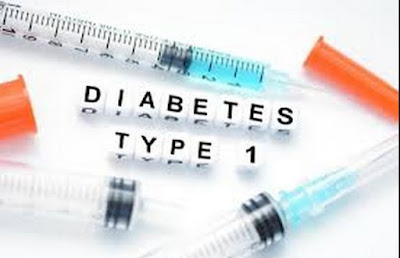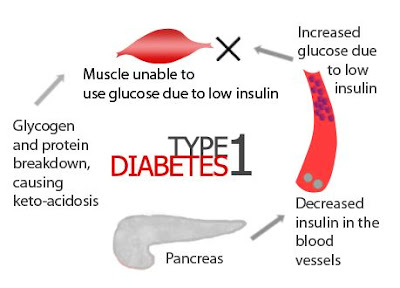Type 1 Diabetes-Symptoms And Causes
Tuesday, 26 September 2017
Add Comment
Type 1 Diabetes-Symptoms And Causes -Diabetes is a chronic disease (chronic) that occurs
when the pancreas (stomach salivary glands) does not produce enough insulin, or
when the body cannot effectively use the insulin.
Whereas type 1 diabetes himself, including the type of diabetes with insulin production. Therefore, type 1 diabetes, also known as insulin dependent diabetes, or known as the autoimmune disease, diabetes by causes that are not yet known for sure.
Whereas type 1 diabetes himself, including the type of diabetes with insulin production. Therefore, type 1 diabetes, also known as insulin dependent diabetes, or known as the autoimmune disease, diabetes by causes that are not yet known for sure.
The levels of sugar in the blood are usually controlled
by the hormone insulin. If the body is less insulin, blood sugar levels will
increase dramatically due to the buildup, this is called hyperglycemia. This is
what happens when a person suffering from type 1 diabetes mellitus.
The cause of the lack of insulin production by the
pancreas in people with type 1 diabetes has not been known until now, so it
cannot be inferred how prevention. This type of diabetes can arise at any age,
generally strikes patients under the age of 40 years, especially children
(childhood-onset diabetic). Sometimes known as the diabetes ' teenagers '
Common symptoms and complications of type 1 Diabetes Sufferers
Common symptoms of diabetes at the beginning of the
disease, also known as the classic symptoms among medical, is a frequent
urination (polyuria), frequent thirst (polydipsia) and often hunger
(polyphagia). These symptoms will develop and worsen along with not control of
very high sugar levels in the blood (hyperglycemia) so that damage the tissues
and organs of the body
Without insulin, glucose in the blood cannot be entered
and used by the cells of the body. Eventually the body will metabolize fat and
muscle into energy so that it leads to weight loss. This can result in acute
condition called Diabetic Ketoacidosis, i.e. a condition where the blood
becomes too acidic and the onset of dehydration that harm.
High blood glucose levels can also cause damage to the
blood vessels, nerves, and organs of the body. Therefore, diabetes can lead to
a number of complications if not controlled properly. The increase in blood
sugar levels that are insignificant and do not trigger symptoms can also result
in damage when it happens in the long term.
Diagnosis and treatment of type 1 Diabetes
Diabetes, type 1 insulin dependent or including
diseases that cannot be cured and can only be controlled. Diagnosis of diabetes
early on is very important so that treatment could be done immediately so that
blood sugar levels high sufferers can be controlled. Diabetes treatment aims to
maintain balance and controlling blood sugar levels symptoms to prevent the
complications that may occur.
 |
| type 1 diabetes |
Pancreas organ in the body type 1 diabetes cannot
produce insulin again so they must receive insulin from outside the body supply
regularly. They are also required to learn to customize the overdose with the
food that is consumed, blood sugar levels, and the activity being performed.
The adjustment process must be done gradually. Some types of insulin that can be used include:
- Insulin that can withstand long work one day.
- A short work that insulin can last a maximum of eight hours.
- Insulin rapid work didn't last long, but reacting quickly.
The way treatment for diabetics could use a combination
of insulin types above.
Transplantation of pancreatic cells that produce
insulin (islet cells) may also be able to help most sufferers of type 1
diabetes. In this process, islet cell from taken from deceased donors will be
entered into the pancreas sufferers of type 1 diabetes.
Islet transplantation is indeed effective for reducing
the risk of severe hypoglycemia. Hypoglycemia is a State in which blood sugar
levels fall too low. This condition is the same with dangerous blood sugar
levels that are too high. But, although there are countries that have already
implemented the islet transplantation, many diabetics who are reluctant to get
through it because the risks are quite high.
Healthy and balanced diet and regular exercise are
proven can lower blood sugar levels for diabetics. Quitting smoking can also
reduce the risk of complications of heart disease.
Early symptoms of type 1 diabetes or known as the classic symptoms, i.e.:
- Frequent urination, especially at night (polyuria).
- Frequent thirst (polydipsia).
- Often feel hunger (polyphagia).
It also can be accompanied by other symptoms that arise
suddenly, among others:
Decrease weight.
Haze due to changes the shape of the lens on the eye.
Fatigue
Symptoms of type 1 diabetes can develop and deteriorate
rapidly within a few weeks or even a few days. When the sufferer is
experiencing nausea, vomiting, breath in, breath, smell like fruit, loss of
appetite, abdominal pain, or high fever, soon encountered the doctor.


0 Response to "Type 1 Diabetes-Symptoms And Causes "
Post a Comment